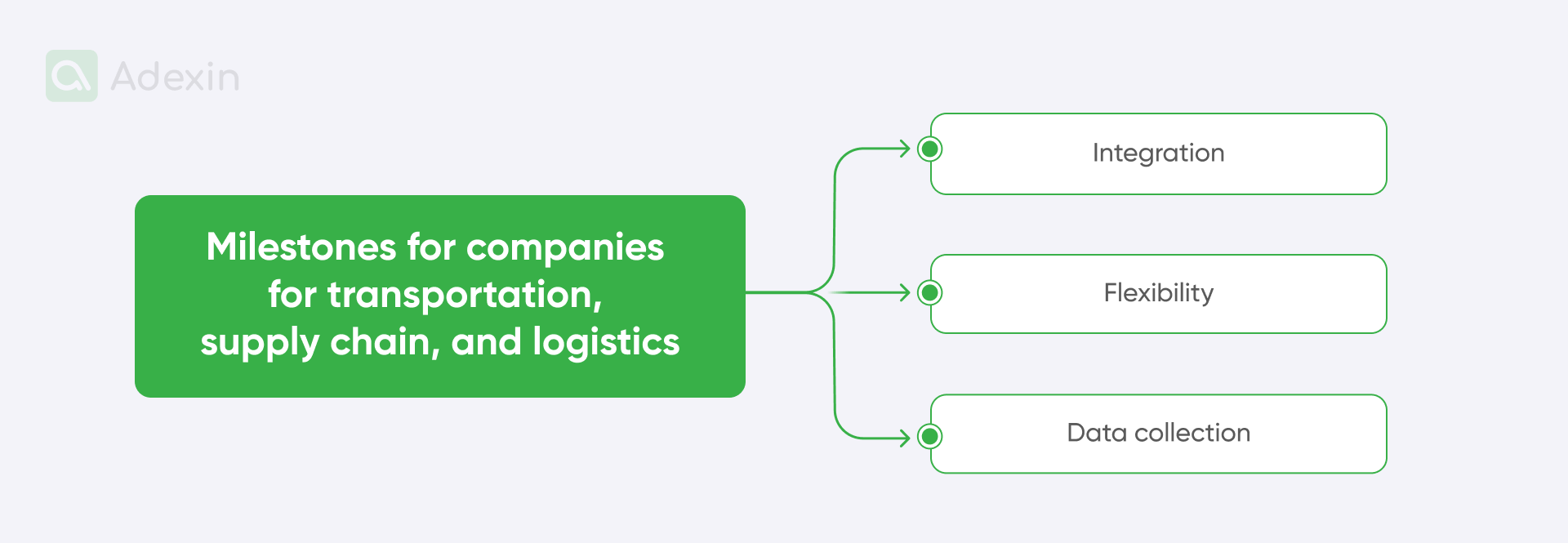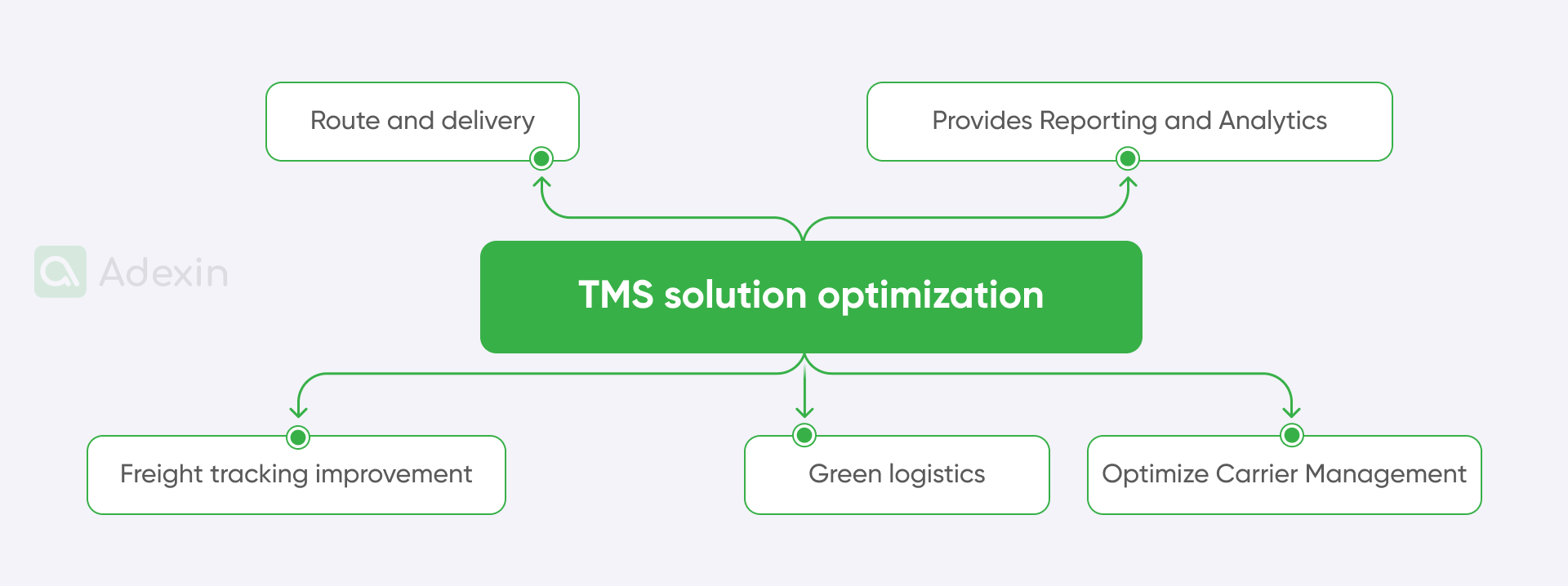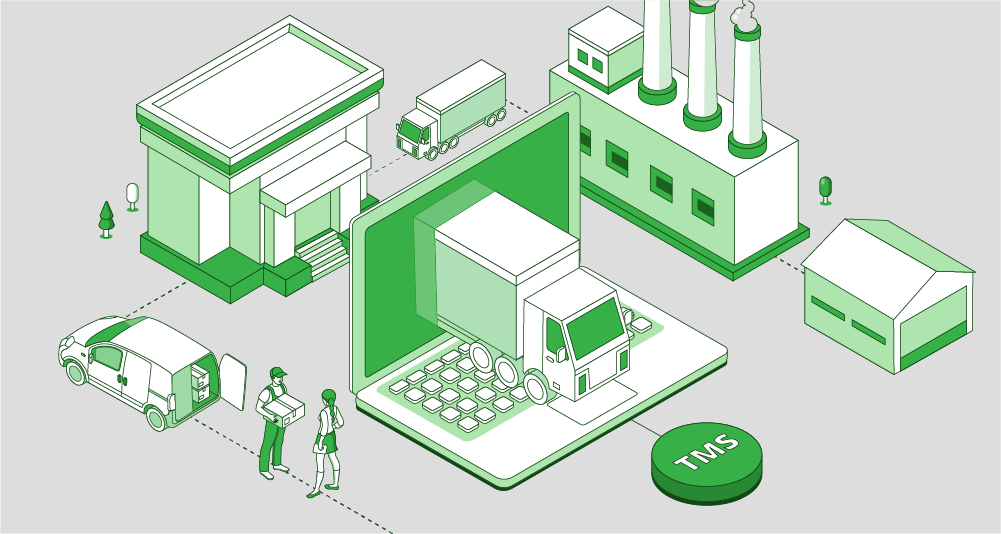In this article, we're taking an approach to bringing closer to the many factors that help model transportation solutions in the supply chain network and logistics. You'll get more insights into technologies in the supply chain. Whether a large business or a startup, you'll see the ultimate benefits of implementing software development to support your business operations. These can help you cut costs and directly generate savings using solutions such as mobile and desktop apps. So, let's move together to explore more subjects and expand your knowledge. Finally, you'll be able to see better through the complex landscape of system providers to know how to choose the best TMS.
Let's outline milestones in transportation, logistics, and supply chain
Global and regional transportation relies on several key elements interconnected by logistics and the supply chain. These elements involve complex operations and planning management. Whether it comes to shipping, scheduling, or consignment traceability, companies aim to achieve the highest level of satisfaction for each target in their operations.
Their targets are mostly focused on revenue- or cost-based pricing, emphasizing the necessity to maximize the resulting marginal profit. The final objective is crucial because the primary competition among companies in these industries is price-based. Simultaneously, the low adoption of digital solutions has slowed the pace of operational improvement, prompting companies to become more aware of the need for changes.
This is why companies are searching for optimal solutions that will help them keep prices low while remaining profitable. However, things will almost always deviate from the plan. It is easier to maintain an unchanged level of service when companies are challenged by so many external influences.
The coordination of flows in the supply chain can be effectively implemented by leveraging the latest developments in information and communication technologies. Simply put, companies can be more effective when implementing logistics, transportation, and supply chain software solutions. One such solution is a transportation management system (TMS) that provides special heuristics to guide solution processes in logistics, transportation, and the supply chain.

Here are the biggest milestones for companies that operate in transportation, supply chain, and logistics:
Integration
For many companies, it becomes clear that the easiest issue to realize is an obvious gap between the scope of Supply Chain Management (SCM) and integrating legally separated systems in various companies from logistics and transportation.
Flexibility
Companies in these industries are implementing system solutions that lack software customization and cannot completely support the requirement specifications arising from Standard Operations Procedures (SOP) or Service Level Agreements (SLA). It causes many problems when businesses must tackle new business challenges.
Data collection
This should be the first significant milestone when building the model for customer management in these industries. Companies require basic data for deliveries; they need to filter and prepare forecasting to improve their planning. Without these capabilities, businesses cannot survive any longer.
These three milestones are indicators in which companies can look for improvements. By focusing on these indicators, you can turn any investment into a relatively quick return on investment. Tackling challenges arising from these milestones can make them much more effective.
Business solution for transport optimization
The setup of the optimization task in transportation, logistics, and supply chain is crucial to keep business operability at the highest level. Companies operating in these industries reflect on different resource combinations to generate feasible and economical plans quickly.
For this purpose, companies are implementing various technologies in the supply chain to remain the most efficient. The top choice that allows them to smoothly tackle all challenges and milestones is the already TMS above that enables companies with optimization capabilities within embedded features.

Here are the areas in transportation, logistics, and supply chain that can be effectively optimized by a TMS solution:
Route and delivery optimization
Companies that operate in the industries above can optimize various transport models by using TMS, from last-mile delivery to just-in-sequence for manufacturing or just-in-time. In the retail business, optimizing reverse logistics will also be crucial to optimize reverse logistics will bring a significant turnaround in distribution operations.
Optimize green logistics
By implementing TMS, you can cut costs for fuel, choose more suitable routes, and save costs on spare parts for your truck fleet. These are the only benefits that can bring your business closer to sustainable logistics. When your business remains green, it can also influence your future prospects, placing your business at the top during procurement peak seasons.
Freight tracking improvement
There is no better way to optimize efficiency on the road than implementing mobile applications. A TMS can be easily integrated with logistics mobile apps for truck drivers. In this way, all stakeholders, from the business customer to the end customer, can see the acceptance via digital proof of delivery (POD) as soon as the package is delivered.
Optimize carrier management
This is a critical aspect of logistics that involves enhancing the efficiency and effectiveness of the transportation network. Managing carriers inside TMS, logistics experts can better focus on crucial areas in transportation for streamlining operations and reducing costs.
Provides reporting and analytics
TMS is responsible for data centralization, consolidating data flow from all integrated systems and features of that system. Your logistics teams can use real-time data visibility performance metrics or analyze historical data to make better decisions.
Despite those five areas above, TMS provides extensive support as a solution for transport management. However, in many companies, there are requirements for providing only basic features that help manage overall most frequent business operations. Nevertheless, each business implicates its own complexity, therefore, the TMS features portfolio is often extended. Whether it's a small TMS solution that enables only single capabilities for your business, such as route planning, or a larger one that combines various functions, many companies are using separate customization approaches. In this way, businesses are also far more effective when it comes to integration with legacy systems.
TMS can include many components to improve their business. Before they make a choice, the first attempt in the system evaluation is often between commercial off-the-shelf (COTS) and custom software development.

Evaluation of commercial off-the-shelf system (COTS)
TMS (transportation management system) in supply chain management is a solution that is equally crucial for small and medium-sized businesses (SMBs) and large transportation companies. Whether you are an SMB or a larger service provider, it is essential to consider business process automation through TMS. This need becomes even more significant regarding business integration with third-party service providers (3PLs). In many cases, logistics startups don't perceive value in using advanced systems for transport management operations management due to their size. Nevertheless, TMS solutions for small and medium-sized businesses are just as important as for larger providers.
Regardless of the company's size, two different approaches exist for implementing TMS. One of those two approaches involves choosing a ready-made solution, commonly called a Commercial Off-The-Shelf system (COTS). Such a system can provide your business with basic features, as outlined below:
Manual booking
It involves manually arranging transportation, often through a reservation system or platform available from TMS. This may include determining pickup and delivery details, selecting carriers, and determining shipping routes. This is handled by exchanging data with carriers and freight forwarders using electronic data interchange (EDI).
Track-and-trace and delivery status updates
This feature includes the ability to monitor the location and progress of shipments in real-time, including through a TMS platform or interface. Shipment tracking systems provide insight into the entire transportation process. This enables staff to proactively manage and quickly respond to delays or problems. Delivery status updates keep stakeholders informed of the current status of their shipments.
Management reporting
This feature includes the ability to monitor the location and progress of shipments in real-time, including through a TMS platform or interface. Shipment tracking systems provide insight into the entire transportation process. This enables staff to proactively manage and quickly respond to delays or problems. Delivery status updates keep stakeholders informed of the current status of their shipments.
Exchange of documents
One of the most important features built into TMS includes the digital exchange of essential documents related to shipments. It can enable your operations with document management system (DMS) functionalities to help you handle documents such as bills of lading, invoices, and customs documents. This streamlines the documentation process, reduces the risk of errors, and increases overall efficiency.
EDI and web interfacing
Electronic data interchange (EDI) facilitates the electronic exchange of business documents between computer systems. Thus, it supports stakeholders connected to your organization. Web interfacing involves using online platforms to interact with and manage logistics processes. Both EDI and web interfacing contribute to smoother communication and collaboration in the supply chain.
EInvoicing and self-billing
EInvoicing involves the electronic generation and transmission of invoices within TMS. This approach reduces paper-based processes and increases accuracy. Self-billing is a method in which the buyer creates an invoice on behalf of the supplier. Freight audit and payment systems automate the verification and payment of freight bills. In this way, your operations ensure accuracy and compliance with agreed terms with various contractors and customers.
These are the basic features of a commercial off-the-shelf TMS. There are many advantages and disadvantages to using COTS as a basic system. The biggest constraints from choosing COTS come from a lack of flexibility and low-quality customer support from the service provider side. A lack of flexibility is nothing more than a lack of customization on demand or customized features that will better fit your business needs.
Features of commercial off-the-shelf TMS solution
Let's assume you want to implement commercial off-the-shelf (COTS) solutions for your transportation management. Perhaps you agree to purchase software in the SaaS (Software-as-a-Service) model. The result is that you get several features that you may not really need for your business operations.

A good example is the TMS system platform, which is available in a subscription model. You may get access to these services:
Shipment optimization. TMS provides tools to optimize shipments by air, sea, parcel, full truckload, or less than truckload. And assists in compliance with international trade regulations and provides international documentation.
Carrier selection. TMS allows you to select carriers based on the least cost per shipment using actual rates. Chooses routes to minimize fuel consumption.
Customer preferences. TMS helps you respect customer preferences. This is especially important especially when specific carriers and freight modes with customer-specific negotiated rates are identified.
Documentation. TMS can create the required documentation and electronically file custom documents. It can automatically select appropriate documents based on the customer, product, and destination. It can help you handle documents such as commercial and pro forma invoices, packing lists, delivery notes, customs declarations, certificates of origin, movement certificates, shipping instructions, and insurance certificates.
Customs reporting. TMS can help you manage files and electronic customs reports and produce required documentation to support non-electronic filings, such as a shipper's letter of instruction (SLI).
Considering that you run business operations that require last-mile delivery, you may want to optimize that area specifically. You definitely do not want to fully utilize some of the functions mentioned above, such as Customs Reporting or Shipment Optimization for international trade regulations, along with the Custom Documents management feature. In short, this means that you'll pay for a service that is not in use. In the field of transportation, logistics, and supply chain solutions, it is crucial not to invest in services that can only be used in the far future. We should make sure that the benefits of the investment will be delivered in a relatively short period of time.

Custom software solution for TMS
The best organizational design in transportation, supply chain, and logistics depends on customization. This is because each company has its own unique characteristics and problems to overcome. For a successful TMS implementation, it is critical to establish a well-organized and strategically positioned transportation management strategy within the organization. Suppose transportation is identified as a strategic differentiator for organizing distribution, logistics, and the supply chain. In that case, cross-functional teams must be empowered to play a strategic role in assessing, selecting, implementing, and developing TMS systems. In short, you need people who understand the transportation industry.
This is only one of the many indicators important for companies that want to implement TMS. However, this approach differs from commercial off-the-shelf (COTS) solutions because, for custom software development, dedicated teams for building your system are available to support specific business needs. With a custom software solution, you may obtain not only basic functions, as in COTS but also a fully integrated solution with the best system features available on the market.
Below are listed the areas where custom software development services can support TMS solutions. The functionalities remain the same as COTS but point out areas that can be customized for your business purposes:
Automated carrier selection
The TMS streamlines the carrier procurement process by determining the best carrier and mode options for each delivery. This area can be customized to include specific business criteria such as preferred carriers, negotiated rates, or service level agreements.
Shipment consolidation
Consolidating shipments is the fastest way to reduce shipping costs. The TMS will evaluate all scheduled shipments and organize them into efficient solutions. At the same time, it maximizes cargo consolidation with each delivery. Customization can be used to tailor a consolidation strategy based on unique business needs and constraints.
Route optimization
The TMS uses maps, road speeds, traffic data, fuel costs, and modal restrictions to determine an optimized route to save time and reduce fuel costs. Customization can be implemented to take into account specialized factors such as preferred routes or specific delivery restrictions.
Optimizing freight estimates
Whether you're bidding or simply calculating shipping costs, TMS will calculate the cost of delivery based on freight weight, shipping method, delivery distance, and other variables and provide comprehensive reports and needs analysis to facilitate the most cost-effective choices. Customization can improve estimate calculations based on unique factors relevant to your business, ensuring accurate and customized financial planning.
Payments
TMS systems include accounting functions that help users reconcile invoices with shipments, control freight bills, and reduce payment errors. Customization can be used to seamlessly integrate with existing financial systems, ensuring a smooth payment process and adapting to an organization's specific invoicing or payment processes.
Need help with transport management systems development?
We are happy to assist you
Explore moreCustom software and application development services for TMS
For example, in custom software development for TMS, we can provide a really broad spectrum of services that can be more affordable. We can also demonstrate how much custom TMS software development can be beneficial for your business in the long run compared to a COTS solution. We can give an example when you already have a solution that allows for extensive route planning. The route planning originated from the system that you implemented years ago. However, as your organization started growing, there was also a growing demand for better fleet management, truck driver management, shipping schedules, and many more.
This is, for example, like in our next cases on parking management and truck driver assistance. In both of these cases, the customer only needed certain functionality, but not the entire TMS system, although the solutions are fully scalable and are planned for extensions and integrations with other company systems.
You still have a lot to consider regarding spending money on a complete end-to-end TMS solution, as you already have a partially satisfied solution in place. Therefore, what you may need now is to find a single solution that can be built on top of existing systems or integrate required functions with your route planning. Here, custom software development for TMS can come into play. A software company that has in-house skills and knowledge about supply chain, logistics, and transportation can easily build the required solution and integrate it with your systems. They can also empower your business with mobility, giving your personnel the ability to connect from anywhere by using mobile devices.
With the information provided above, you can make a better choice when selecting a TMS service provider. Of course, each case requires separate consideration and evaluation. That's the reason why you should be cautious before you make a choice on your business system for transportation, logistics, and supply chain.

Benefits of transportation management systems
Regardless of your choice, whether it's commercial off-the-shelf software or custom-developed TMS software, you gain extensive benefits in your business. We've selected some of them to give you the best-of-breed values that you can get out of TMS:
Reduced manual errors. Automation within TMS minimizes manual data entry errors. This leads to increased accuracy in order processing and reduces the likelihood of shipment delays and customer dissatisfaction.
Optimized carrier management. TMS facilitates efficient carrier management by providing a centralized platform for tracking carrier performance, negotiating rates, and ensuring compliance. This optimization leads to better carrier relationships and cost savings.
Strategic procurement decisions. TMS supports strategic procurement decisions by analyzing historical data, market trends, and carrier performance. This data-driven approach supports negotiating favorable contracts, optimizing procurement processes, and helps achieve better overall procurement outcomes.
Regulatory compliance. TMS helps ensure regulatory compliance by providing features such as documentation management and reporting. This is crucial in navigating complex international shipping regulations and maintaining adherence to industry standards.
Environmental sustainability. You can optimize routes by using TMS, consolidate shipments, and improve overall logistics efficiency. In short, TMS contributes to environmental sustainability, helping reduce fuel consumption, minimize carbon emissions, and align with corporate social responsibility initiatives.
Enhanced collaboration. TMS fosters collaboration among stakeholders in the supply chain. It enables real-time communication between shippers, carriers, and other partners. Your business can be more transparent and create a more collaborative and responsive ecosystem.
Scenario planning and simulation. TMS provides the capability for scenario planning and simulation, allowing businesses to model different logistics scenarios. This supports strategic decision-making, risk management, and preparation for various operational challenges.
Need help with custom software development for your transportation business?
Learn how we can help you
Explore moreFinale takeaway
When reviewing system providers, it is clear that many solution providers can meet your company's needs. It is also important to look at the skills offered by the TMS service providers. Whatever choice you make, it is most important that your business remains profitable.
Implementing TMS in the organization helps anticipate and secure planned savings in a timely manner. It should be noted that not all benefits can be expressed in financial numbers. For example, improvements in customer service and delivery performance are critical to a company's future existence, but translating these improvements into direct financial returns can be difficult. Other benefits include the reduction of manual work, faster document creation, and communication through default digital document setups. This is how you can perceive your TMS system solution in the future.
Adexin has been providing business solutions to transportation, logistics, and the supply chain for years. The market has changed rapidly through that time, but we continue to maintain our custom software development services as the leading solutions provided to the market. With us, you can count on having access to experts who truly understand your industry and can provide you with the best TMS development services. Following the latest trends and technological developments, we ensure that our solutions can keep up with the dynamically changing business. Contact us today, and let's take a look at where we can help with your business.


